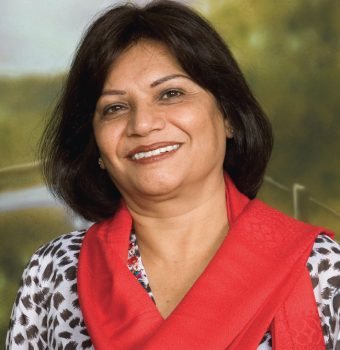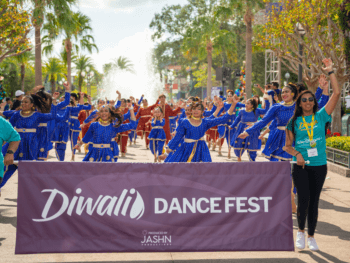
Day in and day out, there are people everywhere in need of help. Hands stretched out, waiting for a human touch to find them, help them. And while many people are busily self-absorbed with their own personal issues, there are others who find strength to reach out. Women are empowering each other every day, extending themselves beyond writing a cheque for charity to getting involved, personally helping people in need and even founding organizations themselves.
ANOKHI caught up with some of these women, both helped by, and helping, those in dire need; these are the stories of ordinary people who have extraordinary passion and courage.
SAHARA:
The South Asian Help and Referral Agency
Creating a violence-free society “He pulls my hair, slaps me, pushes me, and throws things at me, like the food with the plate, and my daughter would cry and throw up and get scared. She kept begging him to stop but he wouldn’t.”
Describing this picture of her home life, Puja (not her real name) struggles to keep from crying. At print time, it has been five months since Puja took her seven-year-old daughter and escaped from her abusive husband. A former doctor, this is not how she envisioned her life.
When she and her husband wed in 2000, he was already a green card holder in the U.S. Vivek (not his real name) stayed with Puja in India for two months before moving to the U.S. During the five years it took for Puja to get her U.S. visa, Vivek returned to India for extended visits with his wife. The verbal abuse started early in the marriage, but Vivek did not begin to abuse Puja physically until she and their daughter (then 15-months-old) joined him in Southern California.
“It was very depressing. I was alone here; no family, no job,” states Puja.
Puja says Vivek never beat their child, but he always abused Puja in her presence, thus making the little girl fear her father. Living in a foreign country without familial support, Puja was under her husband’s thumb. Lacking a driver’s license, access to money, or even a key to their mailbox, Puja felt helpless.

 Women like Puja, who are in relationships that are physically, emotionally, financially, legally and/or sexually abusive, face daunting barriers posed by cultural norms, language, economic and immigration status. The economic barriers faced by battered South Asian women frequently force them to remain in unhealthy relationships in order to survive. As non-citizens, they lack access to many public benefits.
Women like Puja, who are in relationships that are physically, emotionally, financially, legally and/or sexually abusive, face daunting barriers posed by cultural norms, language, economic and immigration status. The economic barriers faced by battered South Asian women frequently force them to remain in unhealthy relationships in order to survive. As non-citizens, they lack access to many public benefits.
After tolerating six years of hell, Puja called SAHARA (South Asian Helpline and Referral Agency), a non-profit organization that provides support to victims of domestic violence in southern California. She and her daughter immediately received counselling, both to deal with the psychological ramifications of abuse and to help her move on. “I had never called the police, because I didn’t know where I would go with my child. The SAHARA counsellor advised me to call the police the next time he abused me.”
Later, when Puja discovered her husband had purchased one-way tickets for her and her daughter to return to India, she decided to avail SAHARA of its other services. “We had only a few more days until we were to leave for India,” she says, “SAHARA didn’t want me to confront him, because they didn’t know how severe his abuse would be, so they came and picked us up when he was at work.”
Each year since 2004, SAHARA has assisted four to six women in achieving economic independence. Currently the organization serves 80 clients. Nirupa Sejpal is a child psychologist and one of three SAHARA counsellors. According to Sejpal, a handful of SAHARA’s current clients are approaching economic independence. Puja is one of them. In the past five months, SAHARA has helped Puja and her daughter by providing psychological counselling, driver’s education, a transitional home and professional connections.
Sejpal explains that the organization goes to great lengths to prepare women to support themselves. “We educate them in anything that they are interested in, to any level– cosmetology, accounting, medical school…”
Since Rekha Bajaria assumed leadership of SAHARA in 2006, the organization’s infrastructure and clientele has grown 300 per cent. In the first two weeks of 2008, Bajaria increased staff and acquired a donated new car to bring clients to immigration, driving school, job interviews, etc. Also in September 2007, the SAHARA Education Center opened, fully-equipped and funded by a $57,000 grant from Hewlett-Packard. All levels of computer classes are offered morning and evening to accommodate clients’ work schedules.
By the end of 2009, the group intends to expand SAHARA's Transitional Living Home into an apartment complex with 25 units. The existing home only accommodates five women and one child in a communal setting. Sejpal explains the rationale behind the apartment-style transitional home they hope to create: “When these women live separately in studio apartments, they can learn to live independently.” SAHARA’s dedicated volunteers are writing grants to make this vision a reality.
Clients are encouraged to be independent within eighteen months. Puja is a SAHARA success story. She now works as a microbiologist at a pharmaceutical company, has passed her driving test and is ready to move out of the shelter. She hopes to practice medicine again one day, but needs stability while she prepares for her board exams. “We are taking one step at a time…I’m trying to get independent.” says Puja, “She has not spoken with Vivek since August, communicating instead through her divorce attorney.
Like other clients, once Puja and her daughter have left the transitional home, they will be encouraged to return to SAHARA for therapy as needed. It’s this kind of follow-through that Sejpal says makes the difference in people’s lives. “Though SAHARA shouldn’t exist, it does. We make somebody smile every day.” Although Puja faces great challenges, the worst is behind her, and she is pleased to report that her daughter has never been happier.
For more information or to help, visit SAHARA-socal.org
BY REBEKAH L. FRASER














































































































